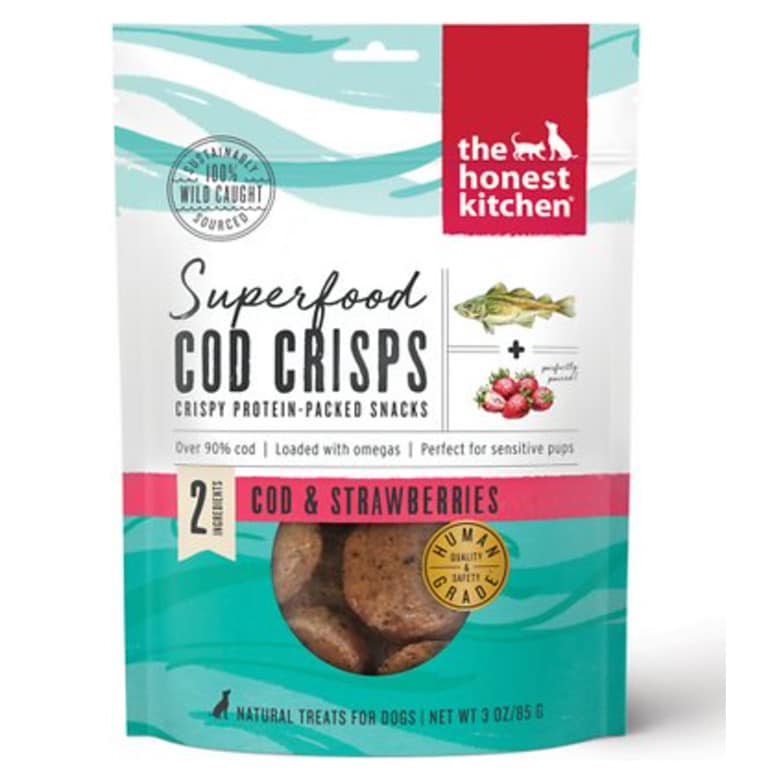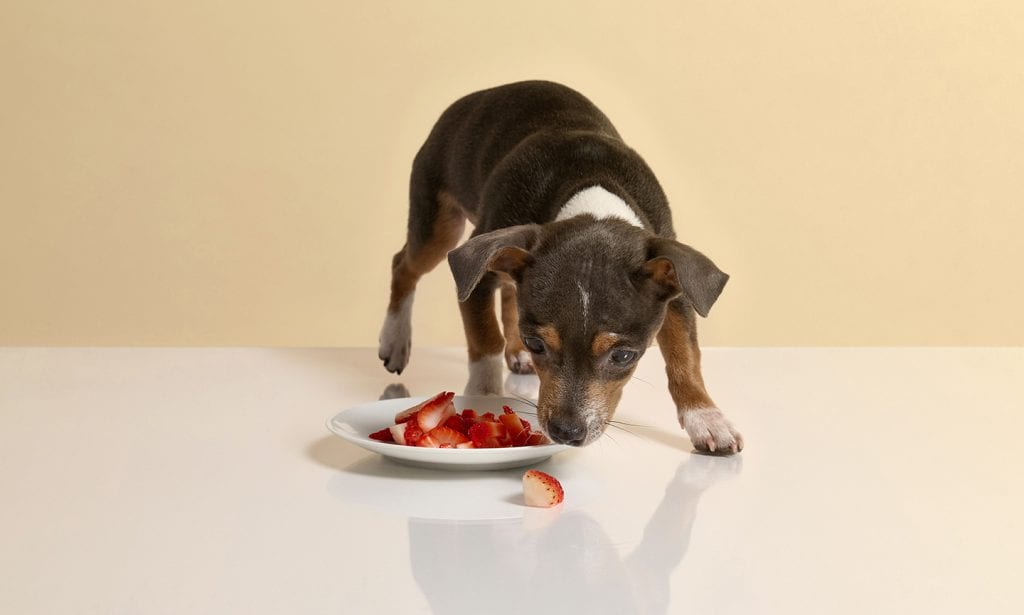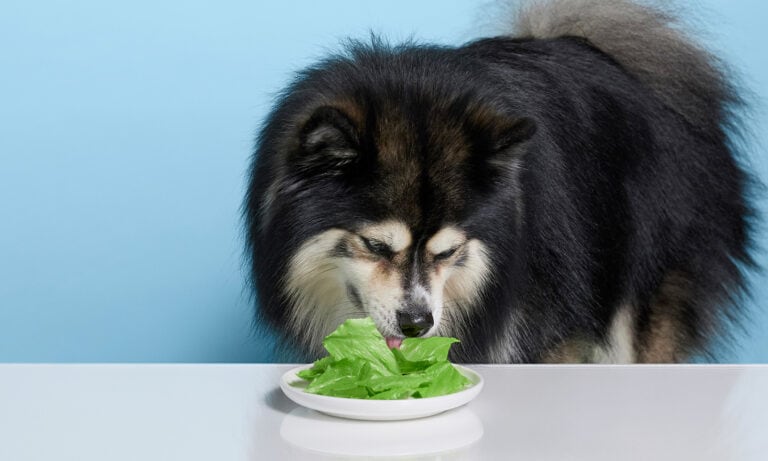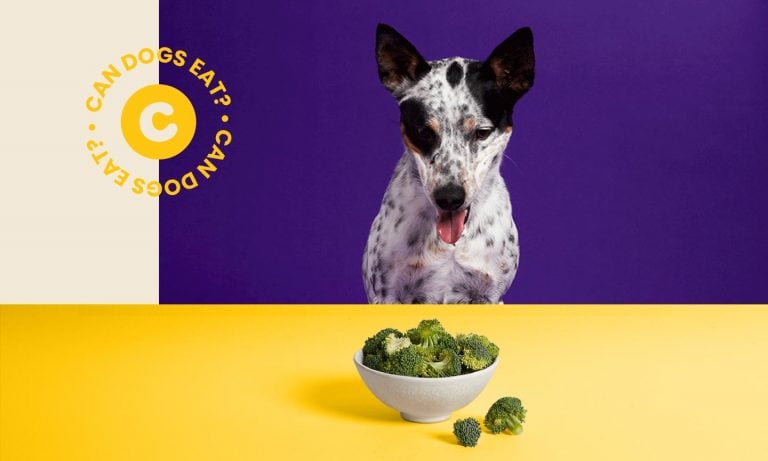Can dogs eat strawberries? Yes, they can!
If you are wondering if dogs can have strawberries, how many and how often, the good news is that these juicy, sweet, delicious berries are safe for dogs to eat, packed with nutritional benefits and are a healthy addition to your dog’s diet when served in moderation either fresh or frozen.
We spoke with Dr. Deborah Bayazit, co-owner and Medical Director of Brilliant Veterinary Care, for tips and advice on how to include strawberries in your pup’s diet.
Benefits of Strawberries for Dogs
According to Dr. Bayazit, fresh strawberries or unsweetened frozen strawberries boast a host of nutritional benefits for dogs. Here are just a few:
- High in immune system boosting vitamins C, B1, B6, and K
- High in minerals including potassium, iodine, magnesium, and folic acid
- Loaded with fiber to aid in digestion
- Contain Omega-3 for skin and coat health.
- Contain an enzyme that can help whiten your dog’s teeth
How to Feed Strawberries to Your Dog
You should always consult with your vet before serving strawberries to determine the right portion size for your dog. Even a healthy treat like strawberries should be factored into your dog’s optimum daily balanced diet. Dr. Bayazit recommends:
- Only feeding fresh or unsweetened frozen strawberries to your dog. Do not feed them strawberries that are canned, sugared or packed in syrup. The sugar content is too high, and these foods might have added preservatives and sweeteners like xylitol which can be deadly. And skip the chocolate-covered ones as chocolate is toxic to dogs.
- Removing the tops, stems and leaves and cutting berries into small-sized chunks to avoid a possible choking hazard. While leaves are not toxic, consuming them can lead to stomach upset.
- Slicing or choping into bite-sized pieces; for smaller dogs mashing up or pureeing the berries and adding them to your dog’s regular food.
- Adding a few small pieces to your dog’s prepared food as a vitamin-booster.
If possible, Dr. Bayazit says buying and serving organic strawberries is always preferable; either way, careful and thorough washing of the fruits is vital prior to serving.
As with any new food added to your pet’s diet, start out serving strawberries very slowly to see how well the fruits are being digested. Soft stool or diarrhea can be indications that strawberries do not agree with your dog, or he has consumed too many.
Frequently Asked Questions
Q: How many strawberries per day can I feed my dog?
A:
For a small dog, one strawberry per day cut into small pieces is enough, for medium dogs 3-4 strawberries and for larger dogs up to 5 strawberries. Strawberries should be served as a treat and can even be offered up every day if factored into your dog’s vet-recommended daily calorie count. Treats should be no more than 10% of your dog’s daily diet and as they contain sugar, strawberries need to be served in moderation. Too many strawberries can potentially cause stomach upset, so start with a few berries and see how your pup takes to them.
Q: Can dogs eat the white section or unripened strawberry tops?
A:
No, this is not a good idea as this can lead to digestive upset. Just slice off tops or slice off and core, serving the rest of the berry.
Q: Can dogs eat strawberry leaves?
A:
No, do not feed the leaves from strawberries to your pup. For one thing they are bitter and not tasty so your dog will probably not enjoy them but more to the point, while non-toxic, strawberry leaves are difficult to digest and can lead to stomach or digestive troubles.
Q: Can dogs eat strawberry stems?
A: No, you will need to remove the stems from strawberries before offering to your dog. Treat them the same as leaves or tops because they aren’t especially nutritious or tasty and can cause stomach trouble for your pup.
Q: Can dogs eat strawberry seeds?
A: Yes, strawberry seeds are safe for dogs to eat.
Top Dog Treats/Foods with Strawberries
Aside from feeding fresh or unsweetened frozen strawberries straight-up to your dog, try making a homemade treat from an easy vet-approved recipe or stock up on prepared options that incorporate both strawberries and strawberry flavors into their foods and treats.

Carob-Covered Strawberries
If you’re feeling inspired to create something from scratch in the kitchen, check out these Carob-Covered Strawberries! A dog-safe alternative to traditional chocolate covered strawberries, these delicious treats take about 20 minutes to prepare and 4 hours to freeze. The end result? A pup-friendly, pup-approved and healthy treat perfect for a special occasion.

PB&J Bites
These Soft Baked PB&J Bites by Three Dog Bakery are reminiscent of a peanut butter and jelly sandwich, and are baked in small batches “by dog-loving bakers in a dog-loving kitchen.” The peanut butter and strawberry flavors are locked in via a slow baking process, and the bite-sized treats are the perfect combination of sweet and crunchy.

Superfood Cod Crisps
Strawberries and cod? Who knew! These all-natural dehydrated treats by The Honest Kitchen feature protein from real cod and delicious flavor from strawberries for a crispy snack that’s free from GMOs, artificial preservatives, grains and fillers. There are just two ingredients – cod, and strawberries.

Strawberry Macarons
Feeling fancy? Bonne et Filou Handmade Strawberry Human-Grade Macaron Dog Treats are a special, sweet treat naturally flavored with real strawberry for a very good dog.
Before serving any new foods, even healthy ones such as fresh strawberries to your dog, consult with your veterinarian for appropriate serving size. If you suspect your pet is sick, please call your vet immediately. For health-related questions, always consult your regular veterinarian when possible as they can make the best recommendations for your pet. (If you need help finding a vet near you use this link.)
What to Feed Your Dog, And What Not To
Share:









